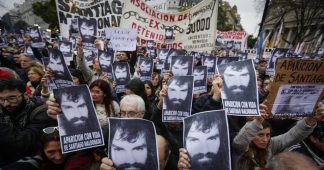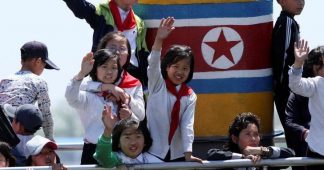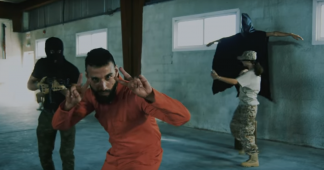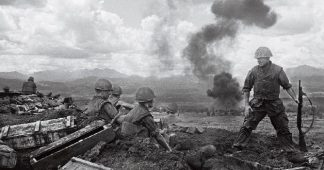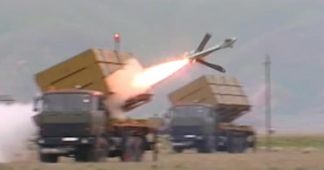The “Chant du Départ” (French for “Song of the Departure”) is a revolutionary and war song written by Étienne Nicolas Méhul (music) and Marie-Joseph Chénier (words) in 1794. It was the official anthem of the First Empire.[1] It is also the regional anthem of French Guiana.
The song was nicknamed “the brother of the Marseillaise” by Republican soldiers. It was presented to Maximilien Robespierre, who called it “magnificent and republican poetry way beyond anything ever made by the Girondin Chénier.“
The song was first performed by the orchestra and choirs of the Music academy on 14 July 1794. 17,000 copies of the music sheets were immediately printed and distributed in the 14 Armies of the Republic. Its original title was Anthem to Liberty; it was changed to its present title by Robespierre.
The song is a musical tableau: each of the seven stanzas is sung by a different character or group of characters:
- The first stanza is the discourse of a deputy cheering his soldiers and encouraging them for the fight for the Republic
- The second stanza is the song of a mother offering the life of her son to the fatherland.
- The fourth stanza is sung by children exalting Joseph Agricol Viala and Joseph Bara, children aged 12 and 13, respectively, who had died for France. Surrounded by Vendeans, Bara was ordered to shout “Long live Louis XVII“; he shouted “Long live the Republic” instead and was executed on the spot. Viala was killed by a very rounded ball as he was trying to sabotage an enemy bridge. His last words were “I die, but I die for the Republic.”
The song is still in the repertoire of the French Army. Valéry Giscard d’Estaing used it as his campaign song for the presidential election of 1974. As a president, he often had it played by troops along with the Marseillaise.
Similarities in melody to the later, less complex The Internationale are unmistakable.
Lyrics
| Un député du Peuple | A deputy of the People |
| La victoire en chantant Nous ouvre la barrière. La Liberté guide nos pas. Et du Nord au Midi La trompette guerrière A sonné l’heure des combats. Tremblez ennemis de la France Rois ivres de sang et d’orgueil. Le Peuple souverain s’avance, Tyrans descendez au cercueil. |
Victory sings Opens its gate for us Liberty guides our steps And from North to South The horn of war Rang the battle hour Tremble, enemies of France Kings drunk on blood and pride Sovereign People comes forth Tyrants go down to your graves |
| Chant des guerriers (Refrain) | Song of the Warriors (Chorus) |
| La République nous appelle Sachons vaincre ou sachons périr Un Français doit vivre pour elle Pour elle un Français doit mourir. |
The Republic is calling us Let’s know how to vanquish or let’s know how to perish A Frenchman must live for her [the Republic] For her [the Republic] a Frenchman must die |
| Une mère de famille | A mother of a family |
| De nos yeux maternels ne craignez pas les larmes : Loin de nous de lâches douleurs ! Nous devons triompher quand vous prenez les armes : C’est aux rois à verser des pleurs. Nous vous avons donné la vie, Guerriers, elle n’est plus à vous ; Tous vos jours sont à la patrie : Elle est votre mère avant nous. (Refrain) |
Do not fear that our motherly eyes shall weep From us begone, cowardly grief! We shall triumph when you take up arms It is kings who should shed a tear We gave you life Warriors, it is no longer yours All your days belong to the Motherland She is your mother more than we are (Chorus) |
| Deux vieillards | Two old men |
| Que le fer paternel arme la main des braves ; Songez à nous au champ de Mars ; Consacrez dans le sang des rois et des esclaves Le fer béni par vos vieillards ; Et, rapportant sous la chaumière Des blessures et des vertus, Venez fermer notre paupière Quand les tyrans ne seront plus. (Refrain) |
May their fathers’ blade be placed in the hands of the brave, Remember us on the Field of Mars (on the battlefield) Baptise in the blood of kings and slaves The blade thus blessed by your elders And by bringing back home Both wounds and virtues Return to shut our eyes When tyrants are no more (Chorus) |
| Un enfant | A child |
| De Barra, de Viala le sort nous fait envie ; Ils sont morts, mais ils ont vaincu. Le lâche accablé d’ans n’a point connu la vie : Qui meurt pour le peuple a vécu. Vous êtes vaillants, nous le sommes : Guidez-nous contre les tyrans ; Les républicains sont des hommes, Les esclaves sont des enfants. (Refrain) |
The fates of Barra and Viala fill us with envy They died, but they prevailed Cowards crushed by the weight of years never truly knew life He who dies for the People has lived You are brave, so are we Lead us against Tyrants Republicans are men Slaves are children (Chorus) |
| Une épouse | A wife |
| Partez, vaillants époux ; les combats sont vos fêtes ; Partez, modèles des guerriers ; Nous cueillerons des fleurs pour en ceindre vos têtes : Nos mains tresserons vos lauriers. Et, si le temple de mémoire S’ouvrait à vos mânes vainqueurs, Nos voix chanterons votre gloire, Nos flancs porteront vos vengeurs. (Refrain) |
Leave, valiant husbands! Battles are your feasts Leave, models for warriors We shall pick flowers to crown your heads Our hands shall braid laurels And if the temple of memory (death) Should open for your victorious manes Our voices shall sing your glory Our wombs shall bear your avengers (Chorus) |
| Une jeune fille | A young girl |
| Et nous, sœurs des héros, nous qui de l’hyménée Ignorons les aimables nœuds ; Si, pour s’unir un jour à notre destinée, Les citoyens forment des vœux, Qu’ils reviennent dans nos murailles Beaux de gloire et de liberté, Et que leur sang, dans les batailles, Ait coulé pour l’égalité. (Refrain) |
And we, sisters of the heroes, we who of Hymenaios marriage’s sweet bonds Are still ignorant If someday to join his fate to ours A citizen should express the wish Let them come back within our walls Embellished with glory and liberty And let their blood, in battle Have spilled for equality (Chorus) |
| Trois guerriers | Three warriors |
| Sur le fer devant Dieu, nous jurons à nos pères, À nos épouses, à nos sœurs, À nos représentants, à nos fils, à nos mères, D’anéantir les oppresseurs : En tous lieux, dans la nuit profonde, Plongeant l’infâme royauté, Les Français donneront au monde Et la paix et la liberté. (Refrain) |
On the iron, before God, we swear to our fathers to our wives, to our sisters to our representatives, to our sons, to our mothers that we shall annihilate oppressors Everywhere, into the deep night by sinking the infamous royalty the French shall give to the world peace and liberty (Chorus) |
